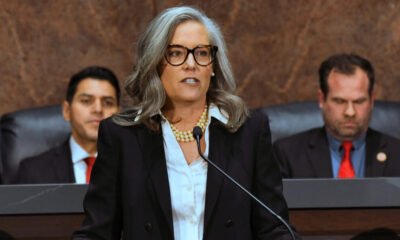Arizona Senate
Senate Approves Bill to Legally Define Biological Sexes

A contentious bill that defines terms related to sex and gender has passed the Arizona Senate, despite robust dissent from Democratic lawmakers. The legislation, known as House Bill 2062 or the Arizona Sex-based Terms Act, seeks to codify definitions for “boy,” “father,” “female,” “girl,” and “male.” It also aims to safeguard single-sex spaces such as bathrooms, locker rooms, and domestic violence shelters.
The bill mandates that any state-collected data identify individuals strictly as male or female. With its passage, the bill now awaits the decision of Governor Katie Hobbs, who has previously vetoed a similar measure. In her veto letter from last year, she expressed her refusal to endorse legislation that she believes undermines the rights of Arizonans.
In a show of support, the advocacy group Independent Women’s Voice urged Governor Hobbs to sign the bill. Their letter highlighted that similar initiatives have garnered bipartisan support nationwide. The group argues that a clear definition of “sex” is critical in combating sex discrimination. “Americans and Arizonans agree that Arizona has an important governmental interest in preventing sex discrimination. But we cannot fight sex discrimination if we cannot define ‘sex,’” the letter stated.
Christy Narsi, Arizona chair of the Independent Women’s Network, emphasized that this bill provides Hobbs with an opportunity to amend her previous veto ahead of her upcoming reelection. “Mass losses in the last election showed that Democrats faced backlash after ignoring the biological realities of sex, a sentiment shared by many Americans,” Narsi noted.
Conversely, opponents of the bill, including Democrats and LGBTQ activists, argue that it would exacerbate discrimination against transgender, nonbinary, and intersex individuals. Senator Lauren Kuby, D-Tempe, criticized the bill for effectively erasing trans identities, which she claims endangers the safety and rights of marginalized groups. “This bill legally erases trans people from existence,” she declared during the Senate debate.
Concerns about mental health impacts on transgender and nonbinary youth were also raised during discussions. Senator Priya Sundareshan, D-Tucson, referenced a psychologist’s note warning that limited definitions of gender could lead to serious mental health challenges. “A lack of validation directly correlates to mental health issues among youth,” she asserted.
Senator Sally Ann Gonzales, D-Tucson, shared her conversations with LGBTQ constituents who feel threatened by the bill. She expressed solidarity with those who have always existed outside the binary definitions imposed by government. “We have always existed, will always exist, whether our own government recognizes us or not,” she said.
On the other hand, Representative Lisa Fink, R-Glendale, the bill’s sponsor, defended it against claims of potential harm to LGBTQ rights. “This bill was carefully crafted to ensure that it does not create special rights for women, nor does it take any rights from anybody else,” Fink stated during a Senate committee hearing. She characterized the legislation as a foundational step for policy discussions regarding gender-related issues.


















